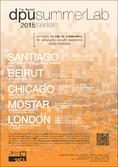public spaces urban africa urban theory conservation & preservation rigenerazione urbana citizenship competition creativity agriculture safety & security Community spatial planning urbanization anthropology European policies inclusive processes planning rural areas historic centers governance brownfields collaborative urban design digitalization newsletter urban regeneration
24 August 2015 – 26 September 2014
DPU SummerLab 2015 series Santiago - Beirut - Chicago - Mostar - London
London, UK
DEADLINE | Monday 6 July 2015
DPU - Bartlett Development Planning Unit
UCL - University College of London
DPU SummerlLab
The DPU summerLab – by now five years old – is a unique platform for one-week design workshops in urban contested spaces. Through the summerLab, we have been partnering with professionals, universities and other civil society organisations that had interests in analysing a particular urban condition and propose design strategies in collaboration with us: it has been truly a great opportunity to open up research pathways and explore new grounds of investigation while starting up fruitful partnerships.
DPU summerLab 2014 series
For this year’s series, we have been overwhelmed by requests and ideas, to the extent of deciding to offer the unprecedented number of five workshops.
After the success of last year's initiatives we are pleased to offer again the workshops in Beirut and in our own backyard in London, respectively in collaboration with the American University in Beirut Neighbourhood Initiative and with long-time DPU friend Alberto Duman. Thanks to the interest and help of COES (Centro de Estudios de Conflictos y Cohesión Social), we are happy to go back to Santiago de Chile after a first experience in 2013. Finally, we are introducing two new exciting destinations: Chicago, in collaboration with the Puerto Rican Agenda and the University of Illinois at Chicago, and Mostar, with SPKD Prosvjeta Mostar and LDA Zavidovici.
THE SCHEDULE OF THE DPU SUMMERLAB 2015 SERIES IS:
Santiago | 24-29 August
“Heritage, Conflict, Urban Change”
Beirut | 31 August - 5 September
“Imagining Bliss”
Chicago | 7 - 12 September
“Puerto Rican Diaspora”
Mostar | 14-19 September
“Common Grounds”
London | 21-26 September
“Localising Legacies”
FEES
The international participation fee for each SummerLab is £400.
For currently enrolled DPU students and DPU alumni the fee is £300.
If a participant registers for multiple workshops, the total fee will be discounted with each additional workshop.
Please note these fees do not include travel or accommodation, though advice and local information can be provided.
APPLICATIONS
The closing date for applications is Monday 6 July 2015.
For more information and to apply please visit
www.bartlett.ucl.ac.uk/dpu/programmes/summerlab
or write to dpusummerlab@ucl.ac.uk
INFO CONTACT
DPU SummerLab 2015 series" Webpage
EMAIL | dpusummerlab@ucl.ac.uk
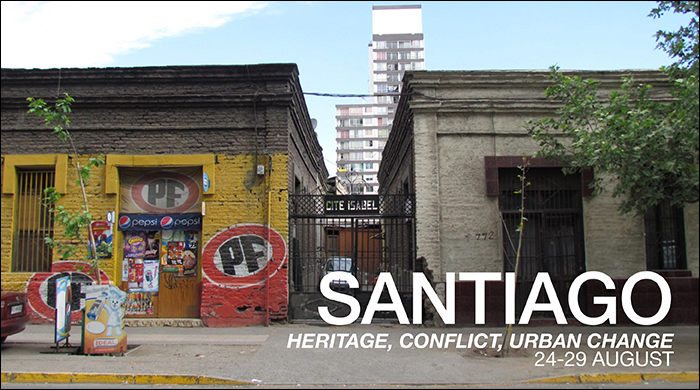
24-29 August 2015
Santiago | “Heritage, Conflict, Urban Change”
in collaboration with COES - Centro de Estudios de Conflicto y Cohesión Social
The last census showed that – for the first time in decades – the central districts of Santiago de Chile have experienced an increase of their population. This has implied a massive change in the social and spatial dynamics of the area. The several neighbourhoods within central Santiago have faced these transformations in different ways: while some neighbourhoods closer to downtown opened up to massive real estate investments, others have struggled in reaching a balance between speculation, preservation of their architectural and cultural heritage, pressure of new social groups arriving to the area.
This summerLab will take place in an specific area of central Santiago where these phenomena of transformation and increased spaces of encounter for different social groups have been particularly evident, and where local authorities are currently investing in. Specifically, the workshop will look at programmes for the revitalisation of heritage neighbourhoods that strategically aim to identify spaces for economic activation, recover physical and social heritage and reactivate public spaces.
The workshop is conducted in participation with the Centre for Social Conflict and Cohesion Studies (COES), and – building also on the input of local authorities and professionals – aims to explore and map out the spaces of social conflict that such urban change is producing, and to understand the nature of its socio-spatial tensions. We will envision possible pathways of alternative strategies for inclusive and equitable development in the area.
Click here to apply now or to express your interest .
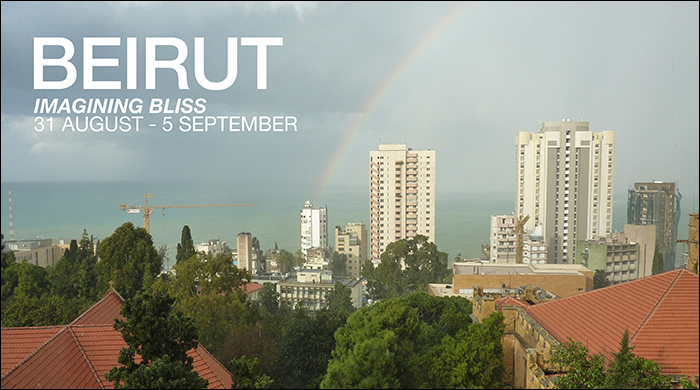
31 August - 5 September 2015
Beirut | “Imagining Bliss”
in collaboration with AUB Neighbourhood Initiative & the Design Department, Académie Libanaise des Beaux-Arts / University of Balamand
The establishment of the American University of Beirut (AUB) in the mid-19th century contributed greatly to the ever-changing urban growth of the Ras Beirut district. Once a farming community far from the gated old city of Beirut, the area has transformed over the past 150 years into an urban educational and commercial hub in the heart of the city. Across from the campus along Bliss Street, urban villas with gardens converted into low to medium rise mixed-use buildings into the early 20th century. Bliss Street currently presents the juxtaposition of a green campus with traditional red-tiled buildings on one side, and a jam-packed urbanised strip on the other. In certain segments of Bliss Street, developers are capitalising on spectacular views of the campus, Mediterranean Sea and Mount Lebanon, to develop luxury residential towers facing AUB.
Despite the political turmoil in the country, international capital is still finding its home in the speculative real-estate sector, accelerating the process of gentrification particularly in the capital. In Ras Beirut, as elsewhere in city, gentrification is changing the character of the area and long-standing residents and shops are being displaced; such trends are affecting the very social and urban fabric of neighbourhood and its main street.
The Beirut summerLab seeks to imagine alternative visions for Bliss Street at a time of dramatic urban transformation. The workshop will provide participants the opportunity to investigate the dynamics that define and shape the street within the wider context of the city. Through understanding the history of the street and its wider surroundings, mapping its activities, and interacting with the different groups of stakeholders, the participants will collaborate to develop proposals that envision a liveable, prosperous and inclusive future for its many realities.
Click here to apply now or to express your interest .
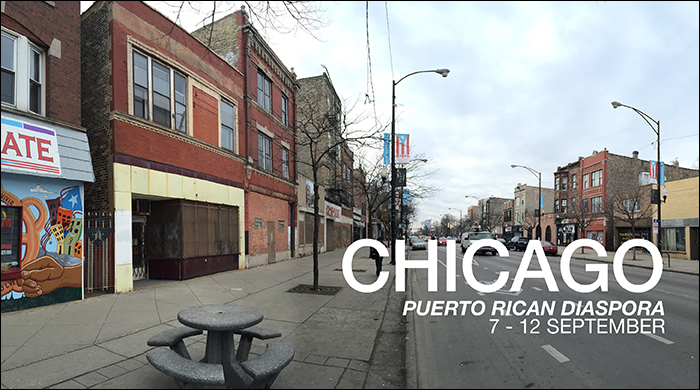
7-12 September 2015
Chicago | “Puerto Rican Diaspora”
in collaboration with Puerto Rican Agenda, Humboldt Park & College of Urban Planning and Public Affairs, University of Illinois at Chicago & Great Cities Institute, University of Illinois at Chicago
Chicago is a key reference for urban scholarship. The city has been historically an epicentre of urban sociology and urban planning practices; it is also well known for its racial segregation patterns, machine-style politics and pioneer modern architecture. As a city of migrants, Chicago has received Puerto Rican migration for over 60 years. For many decades the Puerto Rican population has been pushed further west, displaced from neighbourhood to neighbourhood by urban renewal projects and market-based gentrification.
About two decades ago, in response to threats of displacement, Paseo Boricua, a mile-long segment commercial corridor on Division Street, was envisioned through a participatory planning process to become the cultural, political and economic hub for Chicago’s Puerto Rican community and, most importantly, halt the gentrification coming east. Nowadays, this ethnic enclave has increased the proportion of non-Latino white population and land prices have grown, constituting clear signs of an on-going gentrification process. In this context, the summerLab seeks to unravel the Puerto Rican diaspora spatial practices that characterise their struggle for belonging and their resistance to displacement.
Participants will work along with the University of Illinois at Chicago and the Puerto Rican Agenda to devise proposal for two live-work spaces (at the moment two abandoned portions of urban fabric) and analyse their potential significance and role in their wider context. The Puerto Rican Agenda is a non-incorporated community organisation, which for more than two decades has sought to develop a vision for the Humboldt Park Area – where most Puerto Ricans in Chicago live – pursuing the overarching goal of the Puerto Rican community’s self-determination. In their vision, the live-work spaces (at the moment projects for an Arts Building and a Teachers’ Village are being discussed) represent necessary spatial anchors that would allow the community to spatialise their right to be in the area and to state their cultural identity – allowing them to stay in place and employ innovative practices for their collectively emancipation as a historically marginalised group in the city of Chicago.
Click here to apply now or to express your interest.
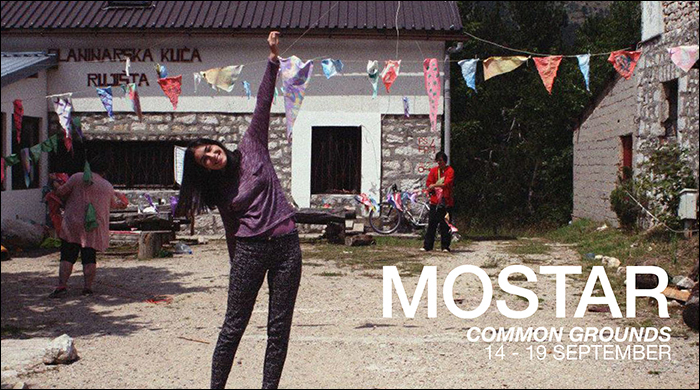
14-19 September 2015
Mostar | "Common Grounds"
in collaboration with Mela Žuljević (SPKD Prosvjeta Mostar) & LDA-Zavidovici
Mostar has been a divided city for the last two decades. The division was brought about by the complex legacy of the conflict that led to the dissolution of Yugoslavia. Despite the absence of a physical barrier, everyday life and everyday spaces results secluded and divided. At the moment, important projects implemented towards the promotion of peace and reconciliation are led by grassroots organisations that promote bottom-up strategies to re-think the future of Mostar, as well as Bosnia Herzegovina as a whole.
The Youth Club Prosvjeta is one of the actors in Mostar working towards reconciliation by promoting and implementing cultural projects. Since 2014, Prosvjeta has been organising an eco-activism festival, ZemFest, on the hill resort Ruište – a recreational resort located 30 km above Mostar. Before the war, this was a popular weekend spot for all Mostarians. The very idea of building a new cultural spot on the hill responds to Prosvjeta's long-term commitment in creating places in which inter-ethnic and inter-cultural collaboration could happen and be sustained.
Considering the success of ZemFest in attracting young and older generations of Mostarians to Ruište, Prosvjeta wants to build on this summerLab experience to devise concrete and holistic strategies to reclaim this space for cultural activities, and to create infrastructures able to host new and innovative projects. Participants will be challenged to think such strategies at multiple scales, grounding them in the wider and complex picture of Mostar's manifold realities: the summerLab will spend time with members of the planning department, local activists, and representatives of civil society's groups in order to map out and understand Mostar's current 'divided' condition, and projecting it onto Ruište's future while re-imagining Mostar differently beyond the legacy of its divisive past.
Click here to apply now or to express your interest.
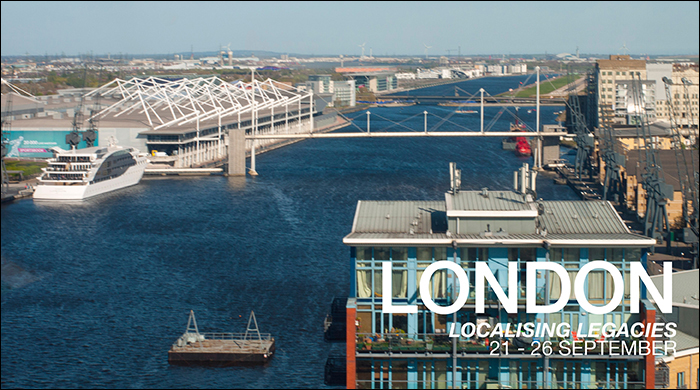
21-26 September 2015
London | “Localising Legacies”
in collaboration with Alberto Duman (School of Art and Design, Middlesex University London)
While the 2012 Olympic Games’ legacy is still fiercely influencing East London development, various pockets of this fluctuating area are already at work to reclaim their place and identity in the midst of capital-driven schemes. The Olympic Village and its satellite developments – in the immediate surroundings and further away following the so-called Newham’s ‘arc of opportunity’ – are only one side of the so-called ‘London Legacy’. On the other side, we see areas containing informal living, buildings that have been squatted, demographic data that remain mostly unknown.
The third edition of London summerLab Localising Legacies wants to focus on the arc of opportunity’s southernmost chunk, the Royal Docks, and ground in their current contested transformation. We will aim to investigate the manifold emergent urbanisms, grassroots organisations, community associations that are struggling to constitute as an alternative to the top-down vision of the Council of Newham and the Mayor of London. Such vision pushes toward a comprehensive regeneration of the Docks, seeing them as "an exciting new business destination": it has so far attracted foreign investments materialising in developments such as The Siemens’ Crystal, the Emirates' cable car, the ExCel (now Abu Dhabi Exhibition Centre) and the Asian Business Port. The Royal Docks are becoming a paradigmatic example of London’s wider urban transformation, with big investments boosting a global image of the city while many residents are left excluded or forgotten in a landscape where social deprivation, lack of services, increased rents and high rates of unemployment represent the strongest challenges to their everyday life.
The summerLab wants to make such contradictions and conflicts visible and tangible: participants will be immersed into the Docklands’ emergent realities through explorations to new landmarks, neighbourhood journeys, citizens’ and communities’ inputs. The workshop configures as platform to favour the encounter of such realities and the design and enactment of a possible new collective and alternative narrative.
Click here to apply now or to express your interest.
Event schedule:
- Start: 08-24-2015
- End: 09-26-2014.
Related articles:




Planum
The Journal of Urbanism
ISSN 1723-0993
owned by
Istituto Nazionale di Urbanistica
published by
Planum Association
ISSN 1723-0993 | Registered at Court of Rome 4/12/2001, num. 514/2001
Web site realized by ChannelWeb & Planum Association | Powered by BEdita 3
